Image courtesy of the Recording Academy
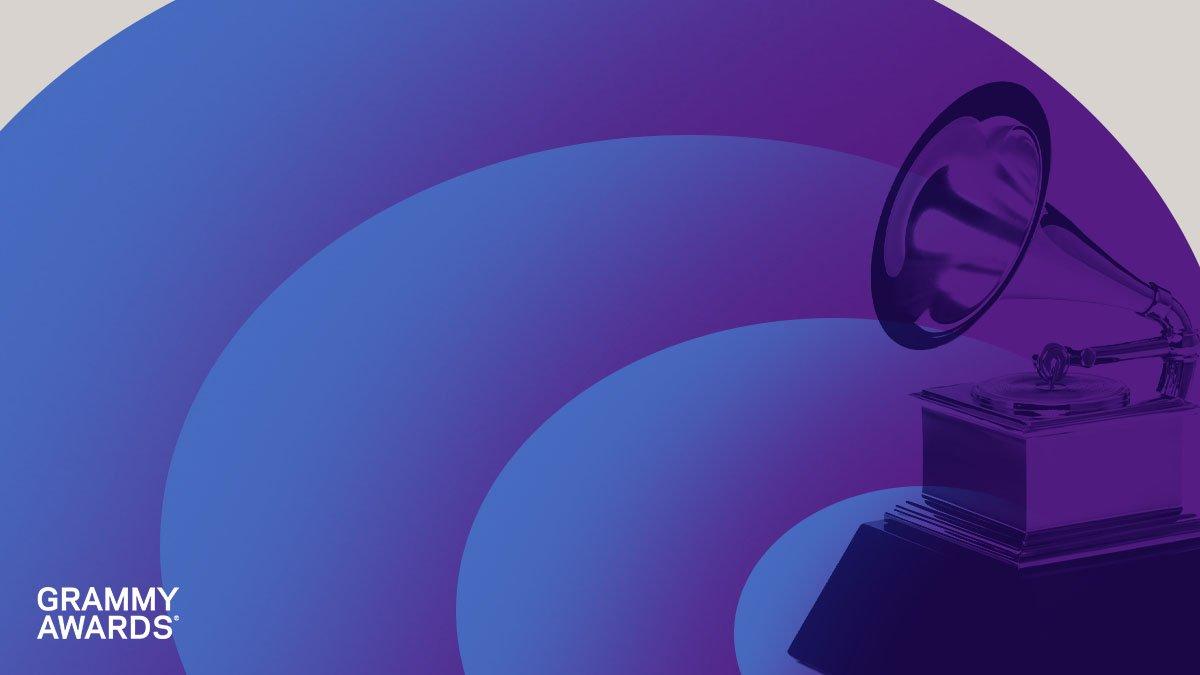
interview
2024 GRAMMYs: How The New Best African Music Performance GRAMMY Category Is A Massive Win For The World
At the 2024 GRAMMYs, African music will be elevated via the newly announced Best African Music Performance GRAMMY category. GRAMMY.com sat down with industry leaders from the African music community to discuss the impact of this major development.
Harvey Mason jr. didn't just visit Africa — he was transformed by it.
In 2022, the Recording Academy CEO visited a number of African countries, where he met with leaders in the local music communities and intently listened to what each had to say.
"Mind-bending. Game-changing. Eye-opening," Mason jr. said of his trips to Africa. "There's so much music, so much creativity over there. Africa is the birthplace of, well, everything, but definitely music."
Accordingly, the universe of sounds coming out of the African continent can't be boiled down to just those having an international impact today, like Afrobeats or Amapiano. No, every corner of Africa is a fount of brilliant musical offerings. So it's incumbent on the Recording Academy, the world's leading community of music professionals, to reflect the momentum happening across Africa.
With this as the engine, the Recording Academy has revealed a thrilling new GRAMMY category in time for the 2024 GRAMMYs: Best African Music Performance.
Announced in tandem with two other exciting, new GRAMMY categories, including Best Alternative Jazz Album and Best Pop Dance Recording, the category elevates all flavors of African music — from Afrobeats to kizomba to Ghanaian drill to South African hip-hop — without regard to borders. Musical excellence from anywhere and everywhere in Africa will be carefully considered in this progressive category.
While this development is a forward-thinking expansion for the Recording Academy, the GRAMMYs, and the international music industry as a whole, the new Best African Music Performance category is the "first step toward a much bigger, more fruitful journey ahead," Mason jr. tells GRAMMY.com. "And we're not done as an Academy: We're making sure that we represent music from that region fairly and accurately."
Read More: 2024 GRAMMYs: 4 Things To Know About The New Categories & Changes
To celebrate the new category, GRAMMY.com sat down with industry leaders — including Mason jr. — to discuss the story behind the brand-new Best African Music Performance GRAMMY category, its impact on the global music industry, and the future of African music.
These interviews were edited and condensed for clarity and brevity.
*Harvey Mason jr. Photo: Emma McIntyre by Getty Images*
Harvey Mason jr.
CEO, The Recording Academy
Harvey, you've spoken extensively about your recent travels to a number of African countries. I've got to imagine those trips informed the new Best African Music Performance category.
Absolutely. I've done three trips to Africa in the last year. I spent a lot of time listening to and hearing from the music community there. There's such a massive amount of talent and creativity in that region, and we're starting to see that penetrating the U.S. market and global market — with Afrobeats and Amapiano and other African genres becoming so popular, driving the sound, and dictating the creativity of artists that are not from that region. You're seeing collaborations and features happening around those genres, which are becoming so popular and are moving the music landscape.
During my time there, I heard from the African music industry, and they all felt like they weren't being represented in our GRAMMY Awards process. It was an eye-opening experience to see the love and respect for the GRAMMYs and the Recording Academy from the continent of Africa. But it was also disheartening to think that they weren't being heard in our process.
That's why I'm really excited about this new GRAMMY category. And I'm really looking forward to seeing what kind of submissions we get and what impact that has on the genres coming from Africa.
It's great to see the Recording Academy's purview spanning the entire African continent — not just popular sounds like Afrobeats or Afro Pop.
It was important for us to make sure we tried to include as many genres as possible, knowing that we were not going to be able to put all the genres being created across the continent.
We can't cover every genre as much as we'd like to and as much as they deserve to be recognized, so this is the first step toward a much bigger, more fruitful journey ahead. And we're not done as an Academy: We're making sure that we represent music from that region fairly and accurately.
Read More: Love Burna Boy & Wizkid? Listen To These 5 African Genres
Can you tell me about the deliberations behind the scenes at the Recording Academy that led to the creation of the Best African Music Performance GRAMMY category?
Deliberations were pretty brief and succinct. Everybody acknowledged the importance of the music coming from that region, and everyone was supportive of the idea. The conversation really centered mostly around the nomenclature — what we were going to call the category — and how we were going to ensure that we represented all the different music that's coming from the region fairly, accurately and inclusively.
Once we realized we couldn't cover everything, we tried to find the sweet spot for making sure that the category was named properly and fairly and in a way that would invite participation from as many people as possible.
Where would you like to see the Recording Academy go from here, as per its embrace of African music from across the continent?
I'd love to see the Academy continue to make sure that we're respecting all music, not just Western music. And I'd like to see us continue to evolve as we have been these past three years: remaining fluid and accommodating, quickly and swiftly, as new genres and new markets emerge.
We need to go deeper and in more detail within different genres of music. We know there are multiple different types of music — hundreds of genres, in fact — coming from Africa and from all 54 countries on the continent. I'd love to see us be able to honor even more music from Africa and other areas of the world.
The future of the Recording Academy is going to build on equity. We're not just honoring music breaking in our country — we're celebrating music from around the world.
Read More: 7 Incredible Sets From AfroNation Miami: WizKid, Uncle Waffles, Black Sherif & More
*Ghazi. Photo: Jessica Chou*
Ghazi
CEO/Founder, EMPIRE
Tell me about the deliberations behind the scenes at the Recording Academy that led to the creation of the Best African Music Performance category.
When we first had Shawn Thwaites, [the Recording Academy's] genre manager for Global Music & African Music, at our EMPIRE headquarters in San Francisco, we discussed the potential for this category to come to life. Not only has African music exploded on a commercial level, which warrants recognition, but on a cultural level, its impact has been immeasurable. Behind the scenes, we focused on sharing information with the Recording Academy that would be valuable to their committee deciding on this category, the consumption and the growth, specifically in North America.
One could spend several lifetimes exploring the diversity of African music. How do you begin to boil all those sounds down to a small list of nominees?
I think we'll see expanded categories in African music in the years to come, but this is a great start toward recognizing the merits and impact of African music. In the meantime, we look forward to working with the Recording Academy in putting together programming to help educate the current membership on the nuances and history of African music.
This new GRAMMY category shows how the Recording Academy is truly a global entity with a global mission to support all music creators and professionals. Where would you like to see the Recording Academy go from here in its global mission to support the international music community?
This is an exciting time in music. Fans are able to access any genre of music from any region of the world at any time. With that, it's inevitable that we'll see large-scale growth in international music in the coming years. It'll be imperative for the Recording Academy to establish a footprint, large or small, on every continent to work side by side with growing music communities around the world and support these artists and creators.
*Tunde Ajaba-Ogundipe. Photo: Harvard Business School*
Tunde Ajaba-Ogundipe
GM, African strategy at Sony Music
Co-founder, No Wahala
Tell me about the deliberations behind the scenes at the Recording Academy that led to the creation of the Best African Music Performance category.
With the Latin community as a reference, we knew that if we could assemble a group of like-minded folks to push the inclusion of diverse African music categories using a long-game strategy, we would be able to try, learn from the misses, optimize, and try again until we found ourselves reaching our goal. We successfully saw that change greenlighted, with the [Best World Music Album] category officially being renamed to [Best Global Music Album] [in 2020].
Throughout the process of appealing to the Recording Academy to have this category added, a key factor was finding like-minded individuals within the organization to form cultural bonds, exchange knowledge, and champion the goal as a unit. We formed think tanks with key allies across the African, American and U.K. music industries, like Angelique Kidjo, Don Jazzy, John Legend, Juls, Riggs Morales, Sevi Spanoudi, Joy Wayodi, and Falu.
After the inclusion of the [Best Global Music Album] category in 2020, we were able to gauge how to collectively push for more inclusion via African music categories. I am grateful that everyone really rallied together to reach the end goal.
In general, what does the international music industry need to do to elevate and honor the African music community and industry?
I always remain an optimist [regarding] African music continuing to influence the global pop scene. With recent waves of music dominance from the current generation of African stars, like Burna Boy, CKay, Oxlade, Black Coffee, etc., I've witnessed many in the industry [mistakenly believe] that similar waves of global recognition of African Music haven't occurred in the past across genres.
I think it means more because of the way music is consumed today and how the African music business — and the business overall — has evolved. It's a lot more challenging to break acts with the attention spans of listeners being more finite now than ever before. Yet, African labels are finding their way into the current landscape.
That said, we should recognize the African icons of the past generations, like Babatunde Olatunji, Sade Adu, Ali Farka Touré, Angélique Kidjo, Ladysmith Black Mambazo, Seal, Sikiru Adepoju, Youssou N'Dour, RedOne, and more, for their wins across GRAMMY categories in the past. It's hard to imagine African music having this moment across the industry without those pioneers opening the doors in an era where it was harder than ever to gain a global audience. They still laid the groundwork, which inspired this generation — directly and indirectly.
[The Recording Academy has] always recognized the opportunities for amplification of African artists, songwriters and producers. I'm a direct witness to their advocacy, championing, and, in some cases, direct education in the past few years to ensure that gaps are bridged between African and diaspora communities and the organization. I'm excited to see the evolution that lies ahead for African music within the Recording Academy and beyond.
*Shawn Thwaites. Photo: Reid Fowler*
**Shawn Thwaites**
Project Manager, Awards, The Recording Academy
Why is it important that the Recording Academy created the Best African Music Performance category?
African music has been a direct influence on America [and other countries]. The unique musical styles and traditions of Africa are too undiluted not to have its own category. Giving African music its own category would highlight and celebrate the diversity and richness of Africa. This is a great step forward!
Can you tell me about the deliberations behind the scenes at the Recording Academy that led to the creation of the Best African Music Performance GRAMMY category?
We met with African music leaders, including artists and executives, and had in-depth conversations on ideas like the name of the category. This collaboration and discussion was a valuable way to ensure that the category for African music was created and remains healthy.
**One could spend several lifetimes exploring the diversity of African music. How do you begin to boil all those sounds down to a small list of nominees?**
The Recording Academy is a peer membership organization. Tracks will be considered by the merit of a song among the voting membership, regardless of its country of origin. This process includes a listening component where screeners are carefully selected to screen the music.
Our product eligibility period for the 2024 GRAMMYs is Oct. 1, 2022, through Sept. 15, 2023. Eligible tracks/singles include vocal and instrumental performances, with strong elements of African cultural significance that blend a stylistic intention, song structure, lyrical content and/or musical representation found in Africa and the African diaspora.
**In general, what does the international music industry need to do to elevate and honor the African music community and industry?**
By celebrating the diversity of African music, we can spread awareness through cultural exchange: more collaborations between artists of different genres and more artist relations between labels and executives in America.
Where would you like to see the Recording Academy go from here in its global mission to support the international music community?
By recognizing the talent and creativity of musicians from diverse backgrounds, the Recording Academy can promote greater understanding and create a more inclusive and diverse global music community.
*Rikki Stein. Photo: Chantal Azari*
Rikki Stein
CEO, Kalakuta Sunrise LTD, a holding company for Knitting Factory Records and Partisan Records
Why is it important that the Recording Academy created the Best African Music Performance category?
Stein: I have long considered Africa as having a tremendous contribution to make in the world, which has yet to be seen and fully appreciated. One day, one day!
Meanwhile, the simplest and most easily accessible aspect of Africa's attributes is its cultural treasure, within which music takes pride of place. In clubs and venues throughout the world today, music from Africa is being enjoyed. Good reason, indeed, for including Best African Music Performance as a GRAMMY category!
One could spend several lifetimes exploring the diversity of African music. How do you begin to boil all those sounds down to a small list of nominees?
Stein: There are certainly a plethora of young [artists] vying for well-earned attention, but let's not forget the previous generation of artists whose music continues to delight fans across the globe.
As Fela Kuti's friend, manager and defender of his legacy, I derive great satisfaction, 25 years after his passing, from seeing the millions of monthly streams of his music. And when I look more deeply into where people are listening to his 50-album catalog, I discover it's everywhere! Khazakstan, Jakarta, Reykjavik, Osaka, as well as the more predictable U.S. and European destinations. So let's not forget the golden oldies!
In general, what does the international music industry need to do to elevate and honor the African music community and industry?
Stein: As a promoter of African music for over 50 years and having spent many of those years banging my head against a glass ceiling, I'm able to give a sigh of relief at seeing serious cracks appearing in that ludicrous structure which — who knows — may well even burst asunder and be no more!
So, let's big up the GRAMMYs and the Recording Academy for making this major contribution to its demise.
*Julian "Juls" Nicco-Annan. Photo: Dbcaptures*
Julian "Juls" Nicco-Annan
Record producer, DJ and songwriter
Why is it important that the Recording Academy created the Best African Music Performance category?
I think it is an amazing addition to the category, given the fact that Africa has a massive impact on music and culture worldwide. It's important for the roots of African culture and sounds to be showcased on a higher stage such as the GRAMMYs to show the world how powerful and influential our sound is. African pop music and culture have been on the steady rise for the last 15 years. It's great to see the GRAMMYs finally take the step to make this happen for us and the continent.
One could spend several lifetimes exploring the diversity of African music. How do you begin to boil all those sounds down to a small list of nominees?
This is where it gets tough. People love to look at West Africa and South Africa predominantly because currently, those sides of the continent are at the forefront.
But East Africa has given birth to some incredible talent. It's important for Africans to push forward to become Recording Academy members, so they can have a voice to push their talent. Experts from different sides of the continent have to advocate. Representation is so important.
In general, what does the international music industry need to do to elevate and honor the African music community and industry?
I think a bit more research into who has been shaping the sound over the last few years is important. Engaging with many who have been documenting the journey of the genre [is important] as well. An African GRAMMYs show would be incredible. Latin America has one, and it has been incredibly successful over the years.
This new GRAMMY category shows how the Recording Academy is truly a global entity with a global mission to support all music creators and professionals. Where would you like to see the Recording Academy go from here in its global mission to support the international music community?
We need more members and more seminars to educate the artists and management back home about the [GRAMMY Awards] process and actually explain things properly. There's a massive disconnect — that gap should be bridged.
What are some African music albums, songs or artists you're personally enjoying right now and would like to shout out?
At the moment, Davido dropped an incredible body of work, Timeless, with the hit record "Unavailable." Worlasi from Ghana dropped a very in-depth and incredible album called The.rap.y, which touches on social issues men and women face; very deep album. I released a single with South African sensation Ami Faku called "Terrified" and J Hus' new record, "Who Told You."
*Mobolaji Kareem. Photo courtesy of EMPIRE*
**Mobolaji Kareem**
Regional Head West Africa, EMPIRE
Why is it important that the Recording Academy created the Best African Music Performance category?
Africa has a rich and vibrant history with 54 diverse countries. There are just as many, if not more, genres of music across the continent, so it's viable to have this category as a starting point that can help define the music coming from here. With this category, a lot more artists/songs … can now have their own stage to compete and be celebrated globally.
In general, what does the international music industry need to do to elevate and honor the African music community and industry?
The African music landscape has exploded globally and needs to continue to be exposed to the masses to help promote inclusivity and appreciation for the art.
Every mainstream music or sporting event, radio station, and beyond should have African music as part of the program to allow for maximum impact. African voices also need to be represented and involved in the decision-making, so this is a crucial step taken by the Recording Academy to give the music coming out of this continent the exposure and reach it deserves.
What are some African music albums, songs or artists you're personally enjoying right now and would like to shout out?
Burna Boy - Love Damini
Asake - Work of Art
Black Sherif - The Villain I Never Was
Bad Boy Timz - No Bad Boy, No Party
7 Incredible Sets From AfroNation Miami: WizKid, Uncle Waffles, Black Sherif & More
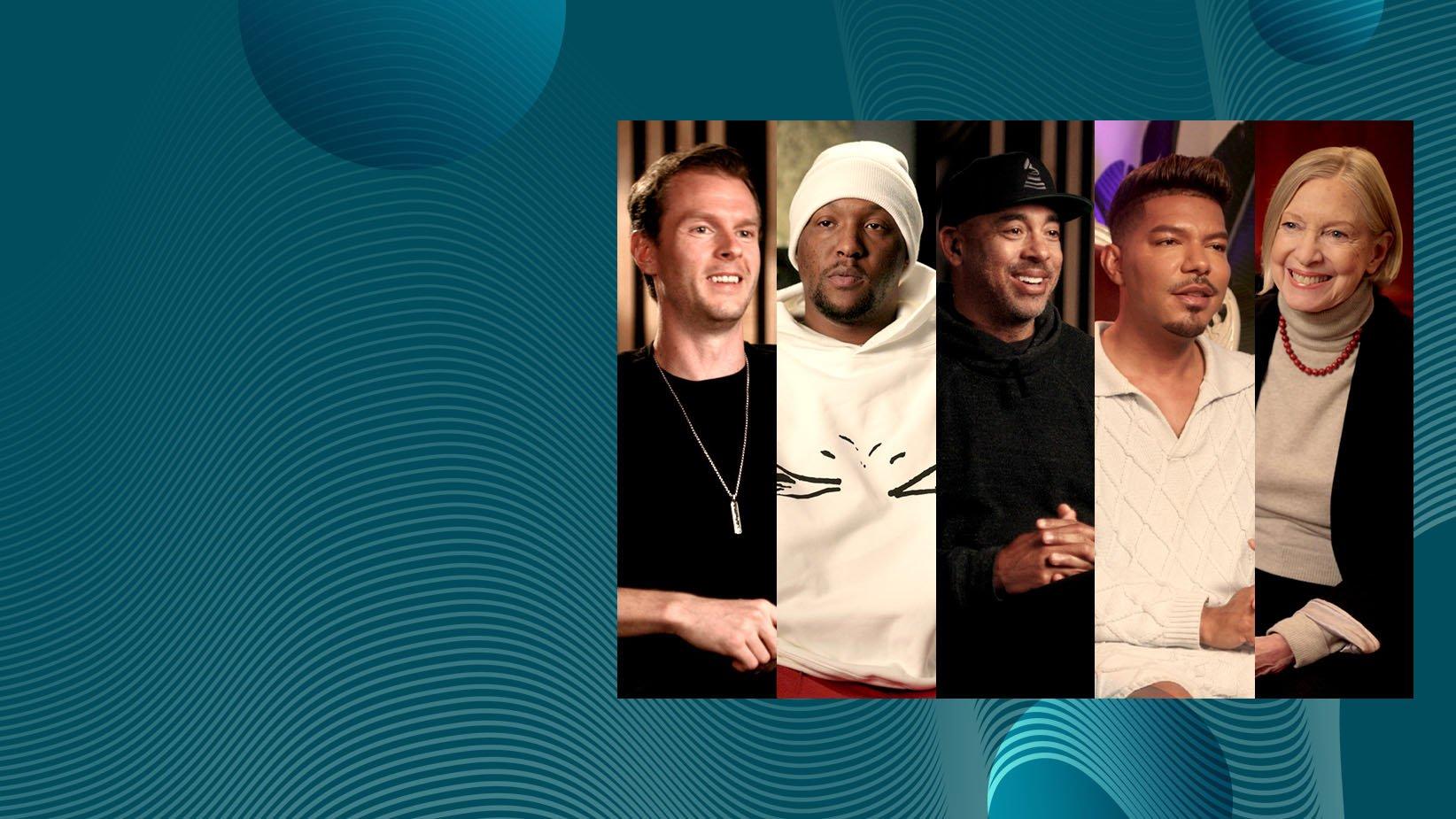
Photos Courtesy of the Recording Academy
news
The New GRAMMY GO Music Production Course Is Now Open: Featuring GRAMMY Winners Hit-Boy, CIRKUT, Judith Sherman & More
Enrollment is now open for GRAMMY GO's new specialization, "Music Production: Crafting Award-Worthy Songs," featuring appearances by GRAMMY winners and nominees. Learn music production and creative strategies from today's industry leaders.
Editor’s Note: Updated to add the Instagram Live video featuring Harvey Mason jr. and Stevie Mackey.
The Recording Academy continues its mission to empower music's next generation with the launch of its second specialization in the GRAMMY GO platform: "Music Production: Crafting Award-Worthy Songs."
This new course, a partnership between the Recording Academy and leading online learning platform Coursera, aims to bolster the technological and audio skills of music producers of all levels. The course, taught by Howard University professor and GRAMMY nominee Carolyn Malachi, features appearances by three-time GRAMMY winner and rap icon Hit-Boy, chart-topping and GRAMMY-winning producer/songwriter CIRKUT, artist and celebrity vocal coach Stevie Mackey, five-time GRAMMY nominee and Recording Academy CEO Harvey Mason jr., and 15-time GRAMMY winner Judith Sherman.
Enrollment for "Music Production: Crafting Award-Worthy Songs" is open now.
Mixing a unique blend of theory and practice, the course teaches music creators of all levels the advanced skills and tools to develop the mindset and confidence of an experienced producer and produce songs of the highest industry standards across all genres. Explore the wide-ranging roles of a music producer, develop critical listening and analysis skills, and master the technical aspects to create music and compositions that cut through the noise. The course's applied learning approach allows learners to sharpen their pre-production skills, utilize Digital Audio Workstations (DAWs) effectively, and produce vocals, instrumentals and samples collaboratively. Through critical listening exercises and discussions, learners will refine their abilities to deliver professional-quality demos.
To celebrate the launch, the Recording Academy hosted an Instagram Live session on Tuesday in which guests Harvey Mason jr. and Stevie Mackey discussed the evolving role of music producers, strategies for working with artists, key elements of top-notch productions, common mixing mistakes, tips for keeping the creative process fresh, and enrollment details for the course.
Building on the success of its first specialization, "Building Your Audience for Music Professionals," GRAMMY GO continues to offer industry-focused education tailored for emerging and established music creators and professionals alike. The innovative platform provides learners with real-time insights from leading music industry figures, ensuring the content remains practical and up to date. GRAMMY GO will also serve as an essential tool in the Recording Academy's global expansion into Africa and the Middle East, empowering music creators through enhanced training, bridging knowledge gaps, and fostering connections within the global music community.
Launched in April in partnership with Coursera, GRAMMY GO is the Recording Academy's first creator-to-creator platform, offering innovative courses tailored for both emerging and established music professionals. The initiative accelerates the Academy's global mission and reinforces its commitment to music education, providing a seamless bridge between all Academy initiatives.
Learn more about GRAMMY GO and the "Music Production: Crafting Award-Worthy Songs" and "Building Your Audience for Music Professionals" specializations.
Watch the Instagram Live session with Harvey Mason jr. and Stevie Mackey in full below:
More Music Education News & Initiatives
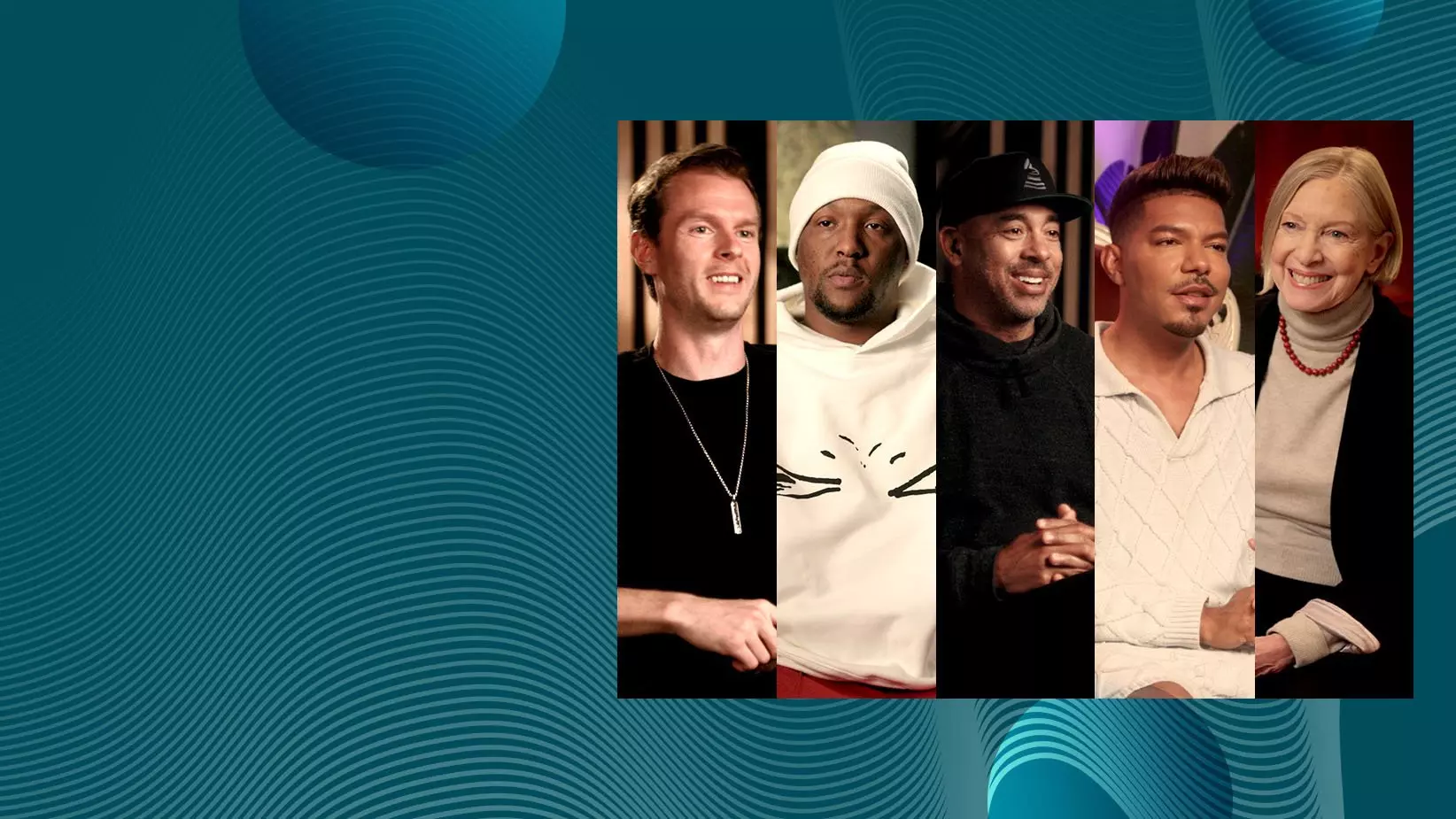
The New GRAMMY GO Music Production Course Is Now Open: Featuring GRAMMY Winners Hit-Boy, CIRKUT, Judith Sherman & More
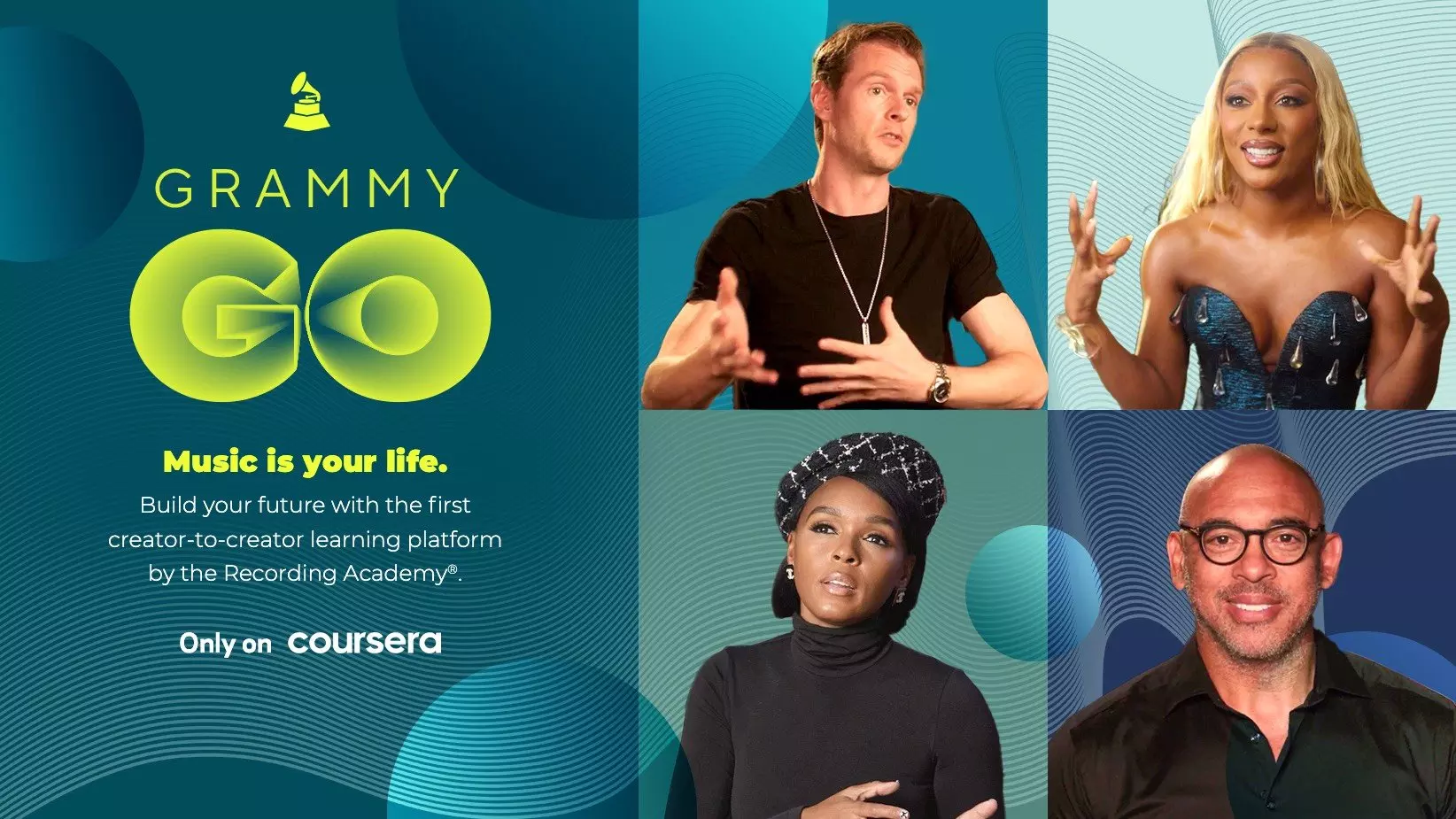
Recording Academy & Coursera Partner To Launch GRAMMY GO Online Learning Initiative
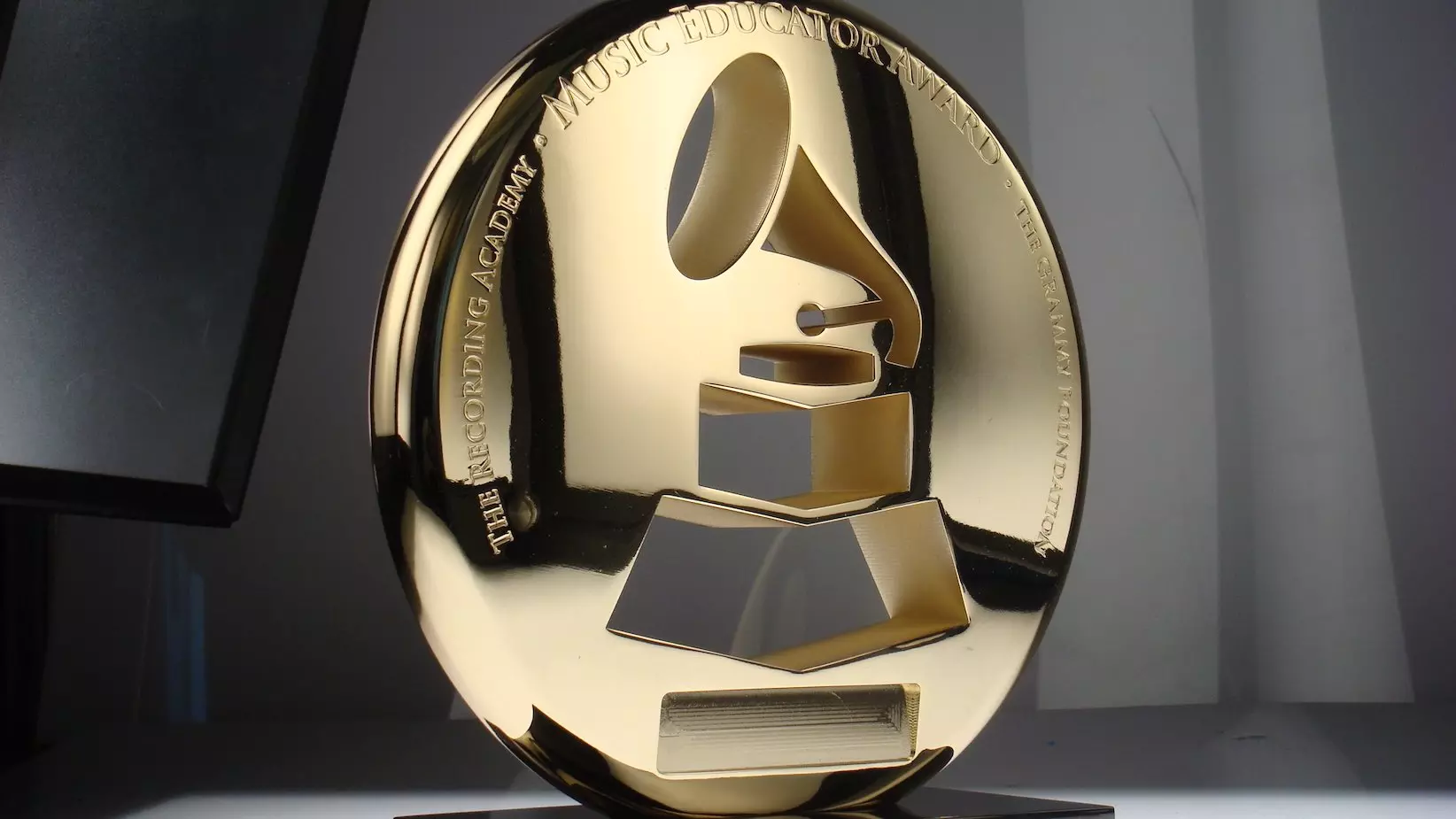
25 Semifinalists Announced For The 2024 Music Educator Award
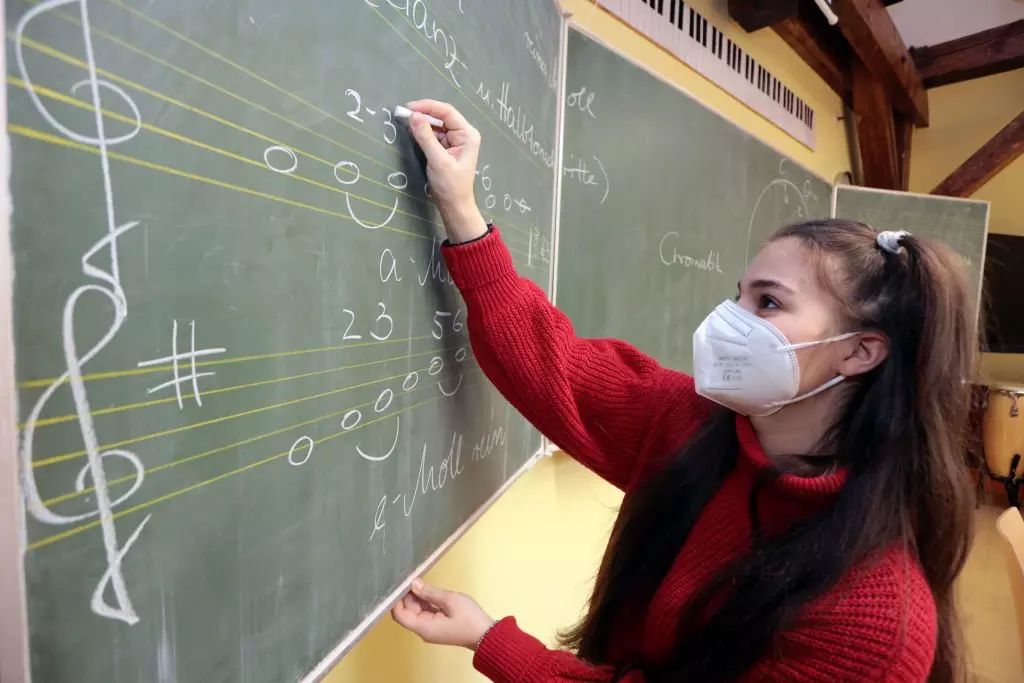
5 Music Teachers Share The Transformative Power Of Music Education
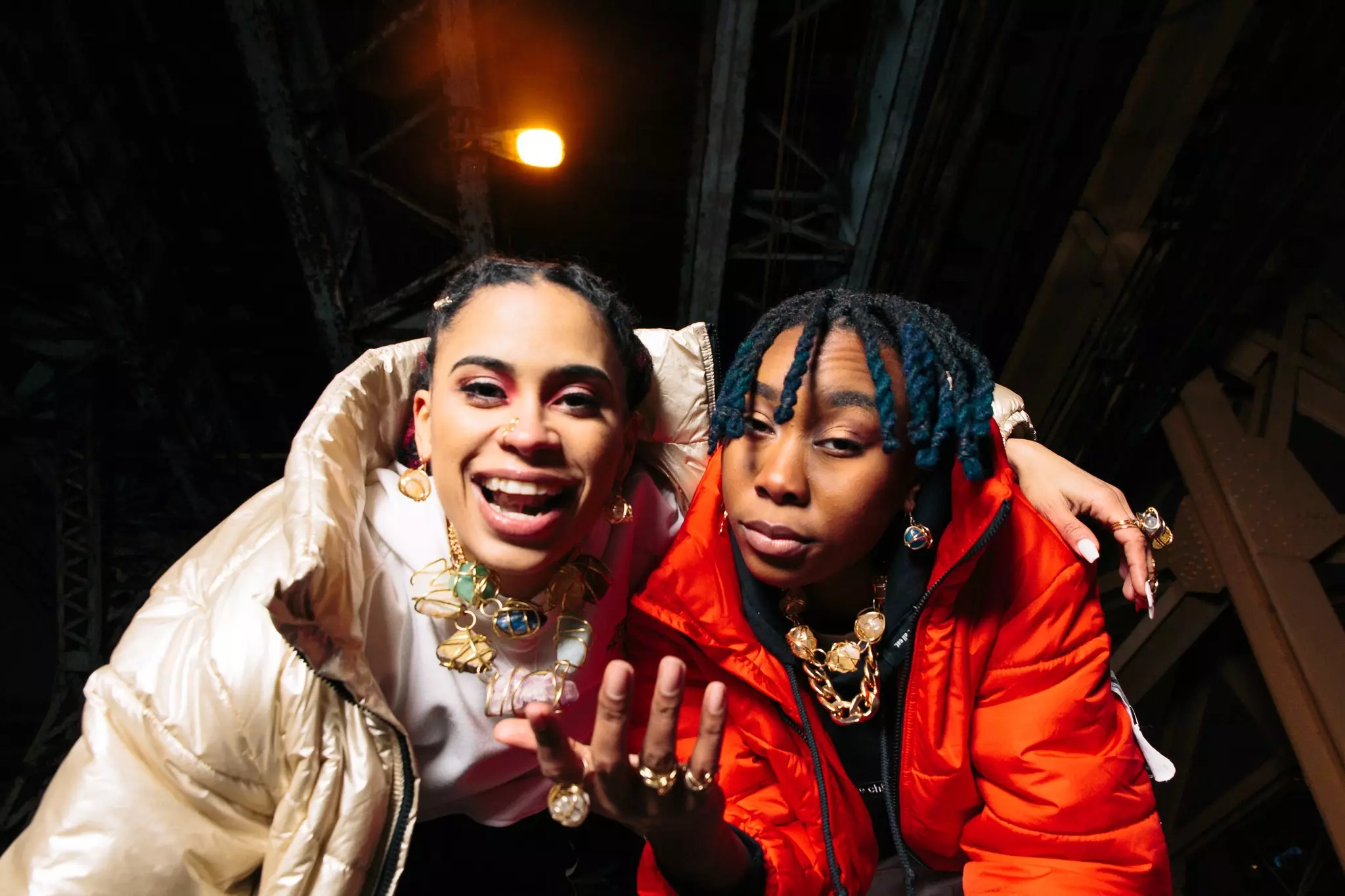
Meet Mother Nature, The Chicago Rap Duo That Teach & Live Self-Expression Through Their Miseducation Of HipHop Youth Workshops
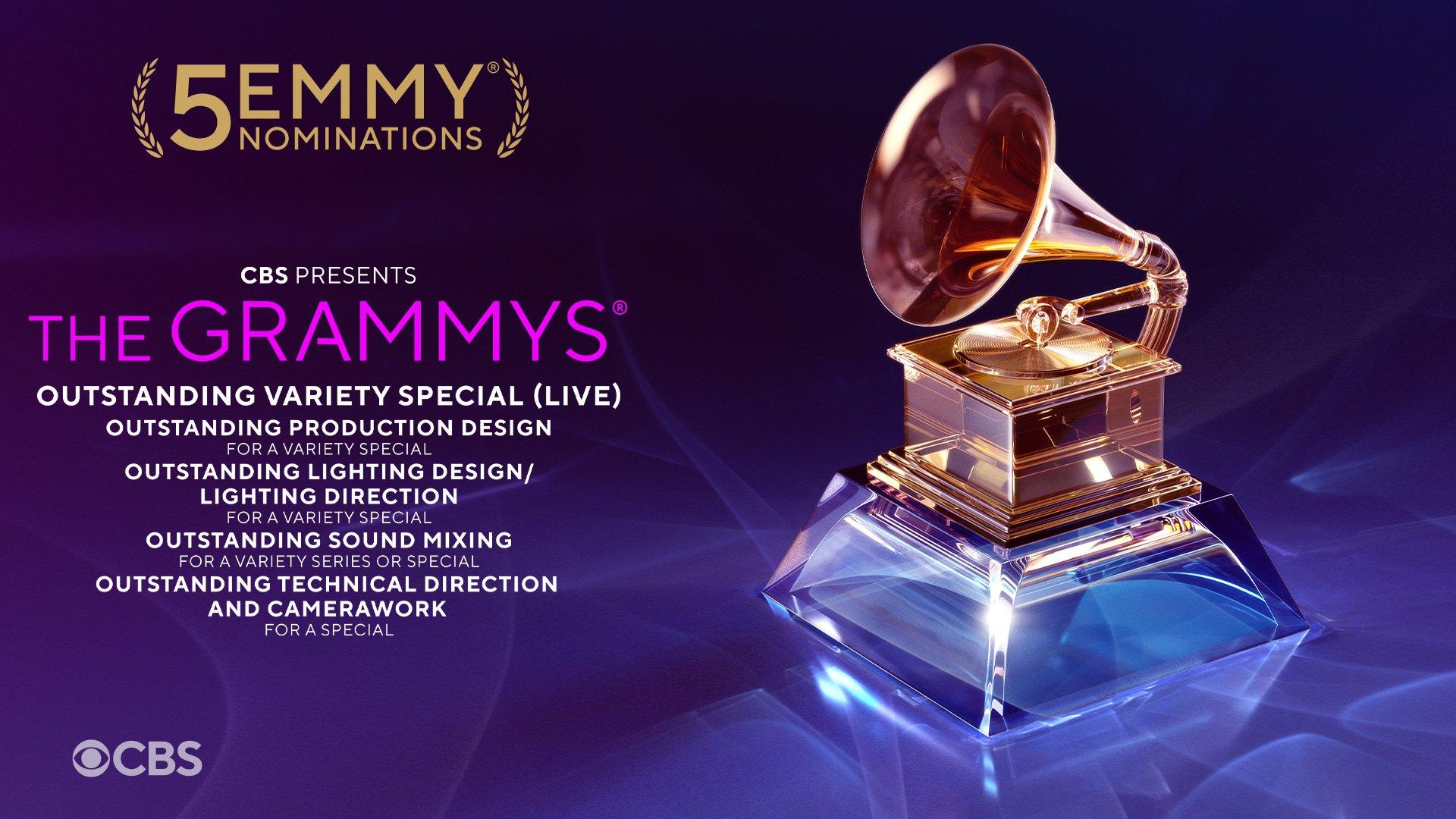
Graphic Courtesy of CBS
news
The 2024 GRAMMYs Have Been Nominated For 5 Emmys: See Which Categories
The 2024 GRAMMYs telecast is nominated for Outstanding Variety Special (Live), Outstanding Production Design For A Variety Special, and three more awards at the 2024 Emmys, which take place Sunday, Sept. 15.
It’s officially awards season! Today, the nominees for the 2024 Emmys dropped — and, happily, the 2024 GRAMMYs telecast received a whopping five nominations.
At the 2024 Emmys, the 2024 GRAMMYs telecast is currently nominated for Outstanding Variety Special (Live), Outstanding Production Design for a Variety Special, Outstanding Lighting Design/Lighting Direction for a Variety Special, Outstanding Sound Mixing for a Variety Series or Special, and Outstanding Technical Direction and Camerawork for a Special.
Across these categories, this puts Music’s Biggest Night in a friendly head-to-head with other prestigious awards shows and live variety specials, including the Super Bowl LVIII Halftime Show starring Usher as well as fellow awards shows the Oscars and the Tonys.
2024 was a banner year for the GRAMMYs. Music heroes returned to the spotlight; across Categories, so many new stars were minted. New GRAMMY Categories received their inaugural winners: Best African Music Performance, Best Alternative Jazz Album and Best Pop Dance Recording. Culture-shaking performances and acceptance speeches went down. Those we lost received a loving farewell via the In Memoriam segment.
The 2025 GRAMMYs will take place Sunday, Feb. 2, live at Crypto.com Arena in Los Angeles and will broadcast live on the CBS Television Network and stream live and on demand on Paramount+. Nominations for the 2025 GRAMMYs will be announced Friday, Nov. 8, 2024.
For more information about the 2025 GRAMMY Awards season, learn more about the annual GRAMMY Awards process, read our FAQ (Frequently Asked Questions) section, view the official GRAMMY Awards Rules and Guidelines, and visit the GRAMMY Award Update Center for a list of real-time changes to the GRAMMY Awards process.
GRAMMY News, Performances & Highlights
2025 GRAMMYs To Take Place Sunday, Feb. 2, Live In Los Angeles; GRAMMY Awards Nominations To Be Announced Friday, Nov. 8, 2024
GRAMMY Awards Updates For The 2025 GRAMMYs: Here's Everything You Need To Know About GRAMMY Awards Categories Changes & Eligibility Guidelines
How To Submit Your Music For The 2025 GRAMMYs: Deadlines & Webinars, GRAMMY Nominations & Voting Process, And More
2024 GRAMMYs: See The Full Winners & Nominees List
The 2024 GRAMMYs Have Been Nominated For 5 Emmys: See Which Categories
10 Must-See Moments From The 2024 GRAMMYs: Taylor Swift Makes History, Billy Joel & Tracy Chapman Return, Boygenius Manifest Childhood Dreams
Watch All The Performances From The 2024 GRAMMYs: Tracy Chapman & Luke Combs, Billie Eilish, Olivia Rodrigo & More
2024 GRAMMYs: Miley Cyrus Celebrates "Flowers" GRAMMY Win With Jubilant Performance
2024 GRAMMYs: Dua Lipa Debuts "Training Season" & Slays "Houdini" In Mesmerizing Opening Performance
2024 GRAMMYs: Taylor Swift Makes GRAMMY History With Fourth Album Of The Year Win For 'Midnights'
2024 GRAMMYs: Billie Eilish Performs An Ethereal Rendition Of "What Was I Made For?"
2024 GRAMMYs: Watch Olivia Rodrigo Bleed Her Soul Dry With Dramatic "Vampire" Performance
SZA Wakes Up The 2024 GRAMMYs With A Performance Of "Snooze" & "Kill Bill"
2024 GRAMMYs: Luke Combs & Tracy Chapman Team Up For A Surprise Duet Version Of "Fast Car"
2024 GRAMMYs: Burna Boy's Fantastic Afro-Fusion Lights Up The Stage
2024 GRAMMYs: Travis Scott Turns Music's Biggest Night Into A Heated Utopia
2024 GRAMMYs: Watch Joni Mitchell Deliver Heartwarming Performance Of "Both Sides Now" In Her GRAMMY Stage Debut
U2 Performs "Atomic City" & Transports The 2024 GRAMMYs To Las Vegas
2024 GRAMMYs In Memoriam: Stevie Wonder, Lenny Kravitz & More Pay Tribute To Late Icons
2024 GRAMMYs: Billie Eilish Wins GRAMMY For Song Of The Year For "What Was I Made For?" From The 'Barbie' Soundtrack
2024 GRAMMYs: Miley Cyrus Wins The GRAMMY For Record Of The Year for "Flowers"
2024 GRAMMYs: Victoria Monét Wins The GRAMMY For Best New Artist
2024 GRAMMYs: Jack Antonoff Wins GRAMMY For Producer Of The Year, Non-Classical For The Third Year In A Row

Theron Thomas Wins Songwriter Of The Year, Non-Classical | 2024 GRAMMYs Acceptance Speech

Watch Taylor Swift Walk The 2024 GRAMMYs Red Carpet
2024 GRAMMYs: Jay-Z Receives Dr. Dre Global Impact Award
Relive The 2024 GRAMMYs Red Carpet: Interviews With Dua Lipa, Ice Spice & More
10 Acceptance Speeches That Made Us Laugh, Cry, & Smile At The 2024 GRAMMYs
Big First Wins At The 2024 GRAMMYs: Karol G, Lainey Wilson, Victoria Monét & More
13 Moments From The 2024 GRAMMYs You Might Have Missed
2024 GRAMMYs Red Carpet Fashion Highlights: Taylor Swift, Dua Lipa, Billie Eilish, Olivia Rodrigo, boygenius & More
9 Ways Women Dominated The 2024 GRAMMYs
Overheard Backstage At The 2024 GRAMMYs: What Jack Antonoff, Laufey & Other GRAMMY Winners Said
How The 2024 GRAMMYs Saw The Return Of Music Heroes & Birthed New Icons
Taylor Swift Announces New Album After 13th GRAMMY Win At The 2024 GRAMMYs
2024 GRAMMYs: Miley Cyrus Wins First-Ever GRAMMY For "Flowers"

Billie Eilish Wins Best Song Written For Visual Media For "What Was I Made For?" (From 'Barbie The Album') | 2024 GRAMMYs Acceptance Speech
2024 GRAMMYs: Karol G Wins The First GRAMMY Award Of Her Career For Best Música Urbana Album

Watch Ice Spice’s 2024 GRAMMYs Red Carpet Interview

boygenius Celebrate Their Three GRAMMY Wins At The CNB "First Look" Cam At The 2024 GRAMMYs Premiere Ceremony
In Memoriam (2023): The Recording Academy Remembers The Music People We Lost

Killer Mike Wins Best Rap Album For 'MICHAEL' | 2024 GRAMMYs Acceptance Speech
2024 GRAMMYs: Tyla Wins First-Ever GRAMMY Award For Best African Music Performance

Watch Billie Eilish & FINNEAS’ 2024 GRAMMYs Red Carpet Interview

Boygenius Wins Best Rock Song For "Not Strong Enough" | 2024 GRAMMYs Acceptance Speech
Burna Boy, Tyla And Africa's Moment At The 2024 GRAMMYs
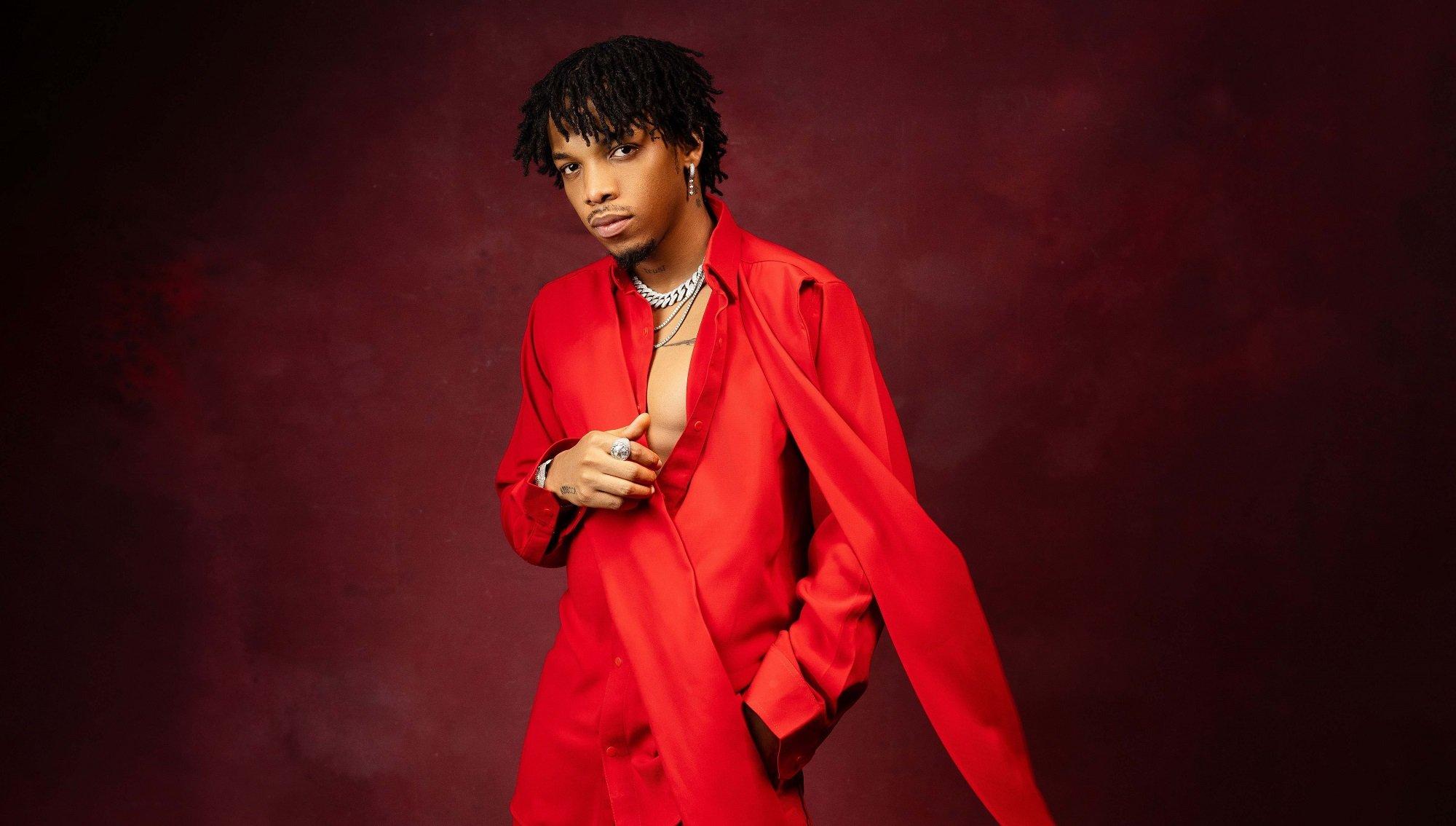
Photo: Emmanuel Oyeleke
interview
Tekno Talks New Music, Touring America & His "Elden Ring" Obsession
Ahead of his Back Outside tour, which hits the U.S. June 22, Nigerian artist Tekno details the origins of his name and sound, as well as his predictions for the future of African music on a global stage.
It takes a lot of guts to declare yourself the "King of Afro-pop," but Tekno has the hits to back it up.
The Nigerian artist is a staple of the country’s Afrobeats scene, responsible for massive hits such as "Pana" (over 66 million Spotify streams). He’s collaborated with massive artists across the world, starting in 2012 when he enlisted Davido for his breakout single "Holiday." He’s also entered the studio with the likes of Drake and Swae Lee, and Billie Eilish is a professed fan.
Despite this, Tekno hasn’t quite reached the levels of fame that colleagues WizKid and Burna Boy have stateside, but that may be about to change. He’s touring extensively across the U.S. this summer as part of his Back Outside Tour, supporting his 2023 album The More The Better. Tekno also recently inaugurated a label partnership with Mr. Eazi-owned emPawa Africa, defecting from SoundCloud.
The video for his latest single, "Wayo," features the artist as a cab driver going through relationship problems. It's a perfect example of Tekno’s classic pan-African pop, with romantic lyrics and a sweetly melodic sound.
GRAMMY.com caught up with Tekno ahead of his tour, which kicks off June 22 in Columbus, Ohio, to chat about his new music, career goals, and a surprising video game obsession.
You recently released a new single. Tell us a little bit about "Wayo?"
"Wayo" is basically me just tapping into my roots sound, the original pan-African Tekno sound. Our music has morphed and just grown into so many different sounds over the years. And it's very easy to forget that this sound existed before all this music that's playing right now. So I had to deep dive into that. That's basically how I describe "Wayo," I call it a basic Tekno love song. Like it's basically how I started really.
I don’t know if you’re aware that there’s an entire genre of music called "Techno?"
Yes, yes, it’s close to house music.
They’re pretty close. Actually, techno music was invented here in America by Black musicians in Detroit.
Oh, wow. Yeah, people don’t really listen to the techno genre out here yet. They prefer more melodic and groovy music.
So in that case, I did want to ask you about your artist name. Because if people don’t really listen to techno music in Africa, where did your name come from?
I was much younger, and I was looking for a name while I was in church. I’m a Christian, so I was looking for a name that had some form of Christianity to it, even though I knew I wanted to be a secular artist. And then I found this name, "tekno," and it's Hebrew, it means something like "God's people" or "God's word." It's spelt a little bit differently, I can't really remember. But I just liked the meaning of it, and the name stuck with me. And that's how I started calling myself "Tekno."
You've declared yourself the "King of Afro-Pop." Why do you consider yourself to be the king of Afro-pop, and why that instead of the King of Afrobeats or another label like that?
It's more of a personal thing in a way. My favorite artist of all time, forever, will always be Michael Jackson. And Michael Jackson is the King of Pop. So when I named myself the "King of Afro-Pop," it’s because I like Michael Jackson, but it's also because I'm the king of Afro-f—ing-pop. So the name just kind of has a good ring to it.
I want to talk a little bit about partnering with Mr. Eazi; why did you decide to join EmPawa? What do you think the partnership holds for your future, and for the future of music in Africa?
I just love making music so much, that's the goal for me. And I've gone from camp to camp, level to level, and after a while it just starts to wear on you. I don't want to just keep moving from Triple MG to Universal to SoundCloud; I want my own thing that’s a little more permanent. And Eazi is not just my friend, he's my brother. We've been talking about this for years, about doing business together.
There are reasons why it made so much sense for us to come together, but I don't want to share everything. But I like being a priority. If I'm on SoundCloud, I don't want to be on a list of 27 artists where I'm maybe number 18 and my music doesn't get the focus it needs. Like, say I put out a song, and everyone on SoundCloud has gone on holiday. And I'm not aware because I'm Nigerian, I don't know that this day or that day is a holiday in the States. But working with a brother and a team that is home, where we know the system and we understand the culture, it's just way, way better. Because we know ourselves, we know our culture. So working with a brother that has this amazing setup at EmPawa, it just made so much sense.
Read more: Mr. Eazi’s Gallery: How The Afrobeats Star Brought His Long-Awaited Album To Life With African Art
You've collaborated with some American artists before, and Billie Eilish said she is a big fan of yours. Is there anyone in the U.S.-UK ecosystem that you would consider a dream collaboration?
I’d definitely love to work with Billie Eilish. 100 percent. But Drake would always be my favorite collaboration, just because we've been in the studio together. We've talked about it. You know, if I start something I want to see it finished.
He's just an inspiration to the business. Drake, he makes you know that you gotta work, because as big as Drake is he works harder than everybody else. That’s not to say that I wouldn’t love to collaborate with so many other artists whose music I really love.
Are you following the beef between Drake and Kendrick at all?
That was so good, man. I didn't consider that a beef, because when I would watch boxers in the ring fight, let’s say I'm watching Mayweather vs. Pacquiao, it doesn't matter who I'm a fan of. It doesn't matter who wins, I'm entertained.
As a big fan of music, I enjoyed every Drake song and I enjoyed every single Kendrick Lamar song. But if you ask me who I prefer, I would always pick sides and choose. But was I entertained? I definitely was, for sure.
How is working with Americans different from working with Africans? What are the distinctions you find between the two?
Back in Nigeria we don't work in big studios, we work at home. Like, if I want to work with Wizkid I would probably go to his house, or he would come to mine, and we would make music there. But if I'm going to work with Travis Scott, we're gonna go to the studio. If I'm working with Billie Eilish we're gonna go to the studio.
You’re touring North America this year. Do you have any expectations, or anything you’re looking forward to?
I'm just happy to be back outside. I went through this period where I had lost my voice in 2019. And after that happened, and I went through surgery in New York, Corona[virus] happened right after.
And in this whole period, I kind of just stayed away from how much I worked and how much I put out music in the past. I feel like I got used to not being active, so I haven't necessarily been performing for a while. That’s why this tour in the U.S. is called The Back Outside Tour. Because for a long time I haven't been outside, I haven’t been performing, I’ve just been at home.
I like to game [and] I like to make music. I make so much music, but I feel like being home has kind of restricted the amount of music I put out. Because anytime I’m outside, I just get this feeling like I want to conquer the world, I want to do more; I want to put out more.
I want to do more than I've done in the past. So this tour for me is just getting back outside, just getting myself out there and just being on the road heavy. You get lazy if you stay home for too long; we’re habitual creatures. So now I have the mindset that I have to forcefully keep myself out there and just be outside. I'm gonna be touring for three months in the U.S. That's a long time.
You mentioned you’re a gamer. What have you been playing recently?
Recently I've been on "GTA V"; the online is extremely good. Just because it has this plethora of radio stations where while you're gaming you can still bask in this vast playlist. And it’s just fun because you get to play with people around the world. I [also] have this Nigerian community I play with. It's like a way to just be around the people even though I'm in the house, so it's really lovely. And "Call of Duty" is a great one too. But my all time favorite I would say is "Elden Ring." I got locked into Elden Ring for like eight weeks.
Amapiano has really become the dominant sound coming out of Africa in recent years. What do you think will be next?
Tekno sound! They miss it! My sound is like "Game of Thrones," season one to seven.
Not season eight.
Not season eight. I didn’t say that, you said that! [Laughs.]
Basically, I’m not saying amapiano isn’t beautiful music, I’m not saying Nigerians haven’t found a way to evolve it in a way that’s different from the South African type. The South African sound will always be the original one, and every time you record on a South African amapiano beat, you can just tell the difference in the sound. It’s their culture, they own it.
But we [Nigerians] are extremely good at taking your sound and putting our own flavor on it. It’s still your sound, but we play with it. So I feel like it’s been two years of the same [amapiano] and after a while people are gonna want another type of song. I’m not saying Amapiano will go away all of a sudden, it’ll never go away. But people want that pan-African sound. The local rhythm. And Tekno got that.
Learn more: 11 Women Pushing Amapiano To Global Heights: Uncle Waffles, Nkosazana Daughter, & More
Can you go into detail? How do you describe this pan-African sound?
These are songs that always tell a story, it’s never just random. "Wayo" is talking about, "If I invest in my love, would I get a return?" "I no come do wayo" means I'm not trying to play games. I'm serious. If I invest in this love, would I get it back? This thing we call love? Do you truly believe in it? Or you're just with me for the sake of dating somebody?
This type of music always has a deep rooted message in the melodies; it's not just like a regular party thing. There's always a good tale behind the sweet melodies. So like, no, no matter how new school our music goes, this type of sound would always be this type of sound. You're not taking it where. It’s culture.
The video for "Wayo" shows you driving a cab. Did you ever have to hold down a day job like that before you became a successful musician?
Oh my god. I've been a houseboy. I catered for four little kids. They were so stubborn, man, that was the hardest thing I've done in my life. [Laughs.] That would have to be a different interview. I've worked in churches, too. I grew up from a very humble background and I'm grateful to God that I experienced that.
Tems On How 'Born In The Wild' Represents Her Story Of "Survival" & Embracing Every Part Of Herself
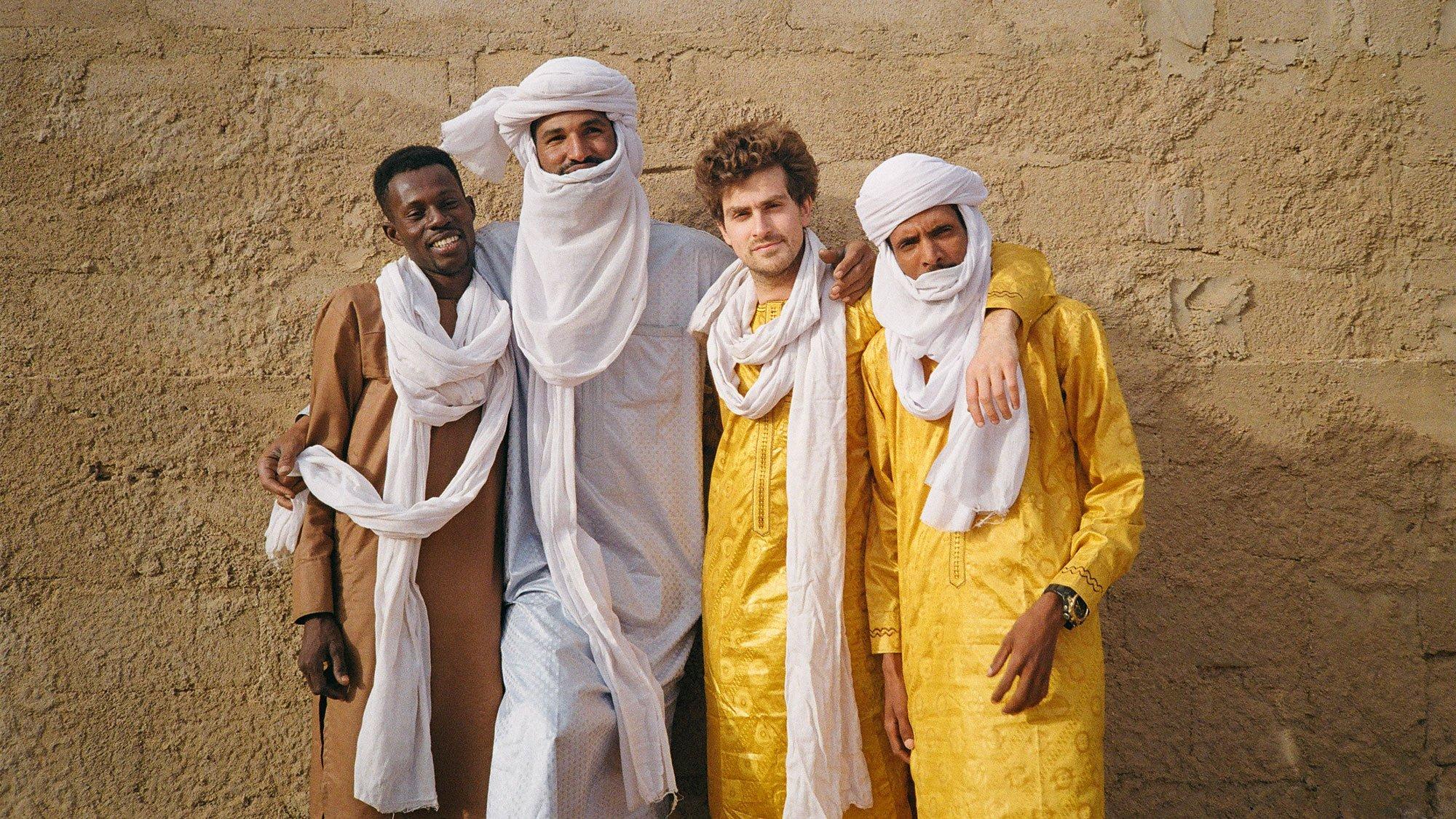
Photo: Nelson Espinal
list
15 Essential Afrorock Songs: From The Funkees To Mdou Moctar
Explore the vibrant history of Afrorock, featuring artists BLO, War-Head Constriction, The Lijadu Sisters, and more that trace Africa's rich musical evolution from the '60s to today.
Music is a cosmopolitan darling. In a world that speaks the language of travel and tourism, generations of sounds meet, influencing each other in a continuous exchange.
When seventeen African countries gained independence from colonial forces in 1960, the culture and entertainment landscape transformed significantly over the next four decades. Genres like highlife, jùjú, ethio-jazz, Raï, Congolese rumba, marabi, and fuji — which reigned before the '60s — gave way to hybrids such as Afrobeat and Afrorock in the late '60s and early '70s. These new styles blended American funk, jazz, rock and psychedelic elements into distinctly African creations.
In Zambia, Zamrock exploded on the music scene in the early '70s as a political statement, influenced by the heavy rock of Jimi Hendrix and smooth funk of James Brown. Bands like WITCH and Paul Ngozi embraced Western sounds while staying true to their roots by singing in Bemba and Nyanja accordingly.
In Nigeria, rock cults like the Fractions, War-Head Constriction, The Hykkers, Ofo and the Black Company, Ofege, The Lijadu Sisters, and BLO emerged in the wee hours of the Nigerian Civil War, swinging their electric guitars and mixing indigenous material with their newfound sounds. When the Nigeria-Biafran War became full-blown, some of these bands were employed to perform by the army, while some laid low in hotels, singing to anyone who cared to listen.
But while Afrobeat, pioneered by multi-instrumentalist Fela Kuti, has gained global recognition and acclaim over the decades as the continent's signature sound, Afrorock has not enjoyed the same achievement. In celebration of the diverse music coming from Africa, here are some classic songs that have defined the Afrorock style over the years.
Monomono — "Kenimania" (1972)
Monomono (Yoruba for "lightning") was one of the first Afrorock bands to emerge from Nigeria. Led by Joni Haastrup on vocals and keyboard, Babá Ken Okulolo on bass and Danjuma "Jimi Lee'' Adamu on the guitars, the group was influenced largely by British rock and Fela Kuti (the album cover literally offers "thanks to brother Fela, for the little hint that did a good job.")
"Kenimania" appeared as a pure instrumental on their popular 1972 LP Give The Beggar A Chance, and vibrates with polyrhythmic drums, and a strained sax riff over a recurring "Hey!" on the track.
BLO — "Chant to Mother Earth" (1973)
The Nigerian trio BLO, short for Berkeley Ike Jones, Laolu Akins Akintobi and Odumosu Gbenga Mike, is often hailed as "the first psych-rock band" from Africa and creators of Nigeria's inaugural psychedelic rock record. What sets BLO apart is their unique sound, which combines a Hendrix-esque rock style with a sleepy, nostalgic texture.
One of their standout tracks, "Chant to Mother Earth" from their 1973 album Chapter One, encapsulates this blend. It's a spiritual and earthy ballad that serves both as a song and an invocation, and it remains one of the trio's enduring hits.
Edzayawa — "Darkness" (1973)
The Ghanaian band Edzawaya developed a distinctive sound rooted in a 6/8 rhythm and heavily influenced by the music of the Ewe people from southeastern Ghana and western Togo, according to Soundway Records. Their only album, Projection One — delivered in 1973 — features "Darkness," a track that blends funk rock with deep percussive elements, part of their unique style. After recording this album under the guidance of Nigerian music legend Fela Kuti and producer Odium Iruoje in Lagos, the band quickly rose to prominence before disbanding in 1975.
War-Head Constriction — "Graceful Bird" (1973)
"Graceful Bird" is a powerful single by the Nigerian band War-Head Constriction, featuring members Etim Bassey, Femi Lasode, and Martin Amenechi. Formed during the Nigerian Civil War, their music captures the intense period of their emergence.
Released under Afrodisia as a single, the track is known for its heavy metal influences, characterized by "long, snarling guitar solos and piles of distortion" according to Pitchfork. The lyrics are a testimony to the harsh turmoil of war and loss. "You just laughed when you saw us cry / Coming to do the slaying / Women fall from grace to grass / Now it's your turn to fade / No, no, no, no, no, no, no, no, no."
The Funkees — "Breakthrough" (1974)
If BLO pioneered Afrorock, The Funkees evolved it, embedding the spirit of their era in their lyrics. Their upbeat music, particularly popular among the rebellious Biafran youth during the Nigerian Civil War, broke through national borders and resonated with the diaspora. "Breakthrough" from their 1974 album Slipping Into Darkness, is a lyrical exploration of mental liberation. The song's influence continues to echo in modern music, with samples by Kendrick Lamar in "Worldwide Steppers" (2022) and Madlib in "Brothers and Sisters" (2010) cementing its status as a significant work.
Akofa Akoussah — "La Lem" (1976)
In 1966, Julie Akofa Akoussah gained significant exposure on the Togolese music scene when she shared the stage with her compatriot Bella Bellow at the first Negro Arts Festival in Dakar, Senegal.
A decade later, her 1976 eponymous album, Akofa Akoussah, transcended both musical genres and national boundaries. Her music captivated audiences in Ghana and Benin and caught the attention of renowned artists such as Miriam Makeba, Manu Dibango, and Aycha Koné. "La Lem", a standout track from the album, features a haunting guitar intro that persists throughout the song, complementing its deeply soulful lyrics.
The Lijadu Sisters — "Life's Gone Down Low" (1976)
Growing up in Ibadan, Nigeria in the '50s, Taiwo and Kehinde Lijadu listened to a lot of records from Elvis Presley, The Beatles, Cliff Richard and Ella Fitzgerald. Far from limiting themselves to a particular style, the duo also drew influences from western jazz, rock, funk and soul, crafting a diverse and experimental sound.
"Life's Gone Down Low" from their Danger album, is a testament to this eclectic style. The song, which gained popular recognition due to an uncredited sample by the rapper Nas on "Life's Gone Low", features an insistent electric guitar hovering over the chorus "Life's gone down / Down / Down / Down / Down."
Amanaz — "Khala My Friend" (1975)
Amanaz, an acronym for Ask Me About Nice Artistes In Zambia, were a force to reckon with in the Zamrock scene of Zambia. Formed in Kitwe in 1973, the five-piece band featured the compelling vocals of lead singer Keith Kabwe and the acid guitars of John Kanyepa and Isaac Mpofu.
The track "Khala My Friend," from the 1975 album Africa, remains a staple in bars and outdoor events across Zambia today. A fusion of rock, funk, and traditional Zambian music, the song is an expression of camaraderie and longing. It has not only become a definitive record of the Zamrock subgenre, but has also gained worldwide acclaim from music critics and enthusiasts alike.
Fadoul — "Bsslama Hbibti" ('70s)
Fadoul, a Moroccan three-piece band, gained notoriety when "Bsslama Hbibti'' was featured in the first compilation by German record label Habibi Funk, which showcased funk, soul and jazz tracks from the 1970s across Sudan, Libya, Morocco and Egypt. While the exact year this gem was recorded is debatable, "Bsslama Hbibti'' is a vibrant mix of funk with some shiny elements of rock that features raw drum beats, fierce guitar riffs, and Fadoul's intense, impassioned lyrics.
Tinariwen — "Matadjem Yinmixan" (2007)
Malian band Tinariwen has become a cornerstone of desert rock, earning a GRAMMY for Best World Music in 2012 and influencing bands including Kel Assouf and Imarhan. Becoming the Fela Kuti of their genre, their music resonates with a distinctive, gritty essence.
"Matadjem Yinmixan" ("Why All This Hate Between You?") from their 2007 album Cler Achel, offers pointed criticism of the terrorist groups in the Sahara region which have even captured the band's own members. On the track, the electric chomp of the guitar intertwines with a buoyant beat as a chorus of voices heightens the lyrical tension.
Vaudou Game feat. Roger Damawuzan — "Pas Contente" (2014)
Vaudou Game is the collaboration of Togolese singer and guitarist Peter Solo and a quintet of instrumentalists from Lyon, France. Their well-known hit "Pas Contente" ("I'm Not Happy") has been touted as a funk ballad, it stands out for its dreamy psychedelic rock guitar echoing throughout the track.
Baba Commandant and The Mandingo Band — "Wasso" (2015)
From Burkina Faso, Baba Commandant and The Mandingo Band is led by Mamadou Sanou, an activist that bridges traditional Manding music with modern Burkinabe funk.
Influenced by the diverse style of Fela Kuti, King Sunny Ade, and Moussa Doumba, the band recorded "Wasso" at the renowned Ouaga Jungle Studios in 2015. The track exemplifies the band's raw and unrefined sound, blending Mandingue guitar, the native harp donso n'goni, dub, and afrobeat into a cohesive funk rock texture.
Imarhan — "Tahabort" (2016)
The desert rock sextet Imarhan is one of the promising avant-garde bands to come out of Northern Africa. Not only do they combine influences as diverse as Algerian Rai music, American jazz, Burkinabe funk, and global pop, they also find solace in ancestral Tamashek poetry.
Off their eponymous album, "Taharbot" stands out as a fast-paced number that skillfully weaves together restless elements of raï and funk. There is a combination of a robust bass, reverb guitar loops, complex polyrhythms, and a sweet spot in the riveting riff.
BCUC — "The Journey with Mr. Van Der Merwe" (2016)
Bantu Continua Uhuru Consciousness (BCUC), formed in Soweto in 2003, uniquely integrates all of South Africa's official languages into their music. The seven-piece act draws from indigenous and modern music, combining ritual songs, fireside chants, church hymns, and rap with a rock and roll spirit.
"The Journey with Mr. Van Der Merwe" from their 2016 The Healing album, is a long spell of different sounds anchored by the presence of a strong electric bass guitar. The song serves as a critique of the exploitation of South Africa's rural poor by the urban elite, and incorporates a traditional South African call-and-response that develops into a dub style mid-song.
Mdou Moctar — "Chismiten" (2021)
From their 2021 album Afrique Victime, "Chismiten" rises amid the politically charged and anti-colonial themes of Mdou Moctar's recent work.
Produced by Michael "Mikey" Coltun, "Chismiten" earned the Tuareg musician and his band attention for challenging conventional definitions of rock music. With its upbeat and danceable sound and strained guitar riffs, Mdou Moctar sings about tişmiten, a Tamasheq word for jealousy. "The song is about how people in a relationship lose their sense of self, they become jealous and envious of others," Mdou explained on Remove.
PRIDE & Black Music Month: Celebrating LGBTQIA+ & Black Voices
Listen To GRAMMY.com's 2024 Pride Month Playlist Of Rising LGBTQIA+ Artists
9 New Pride Anthems For 2024: Sabrina Carpenter's "Espresso," Chappell Roan's "Casual" & More
What's The Future For Black Artists In Country Music? Breland, Reyna Roberts & More Sound Off
Why Beyoncé Is One Of The Most Influential Women In Music History | Run The World
9 Ways To Support Black Musicians & Creators Year-Round
How Beyoncé Is Honoring Black Music History With 'Cowboy Carter,' "Texas Hold Em," 'Renaissance' & More
The Evolution Of The Queer Anthem: From Judy Garland To Lady Gaga & Lil Nas X
15 LGBTQIA+ Artists Performing At 2024 Summer Festivals
50 Artists Who Changed Rap: Jay-Z, The Notorious B.I.G., Dr. Dre, Nicki Minaj, Kendrick Lamar, Eminem & More
Fight The Power: 11 Powerful Protest Songs Advocating For Racial Justice

How Rihanna Uses Her Superstardom To Champion Diversity | Black Sounds Beautiful

How Beyoncé Has Empowered The Black Community Across Her Music And Art | Black Sounds Beautiful
5 Women Essential To Rap: Cardi B, Lil' Kim, MC Lyte, Sylvia Robinson & Tierra Whack
Celebrate 40 Years Of Def Jam With 15 Albums That Show Its Influence & Legacy

Watch Frank Ocean Win Best Urban Contemporary Album At The 2013 GRAMMYs | GRAMMY Rewind
A Brief History Of Black Country Music: 11 Important Tracks From DeFord Bailey, Kane Brown & More
10 Women In African Hip-Hop You Should Know: SGaWD, Nadai Nakai, Sho Madjozi & More
10 Artists Shaping Contemporary Reggae: Samory I, Lila Iké, Iotosh & Others
The Rise Of The Queer Pop Star In The 2010s
How Sam Smith's 'In The Lonely Hour' Became An LGBTQIA+ Trailblazer
How Queer Country Artists Are Creating Space For Inclusive Stories In The Genre

How Jay-Z Became The Blueprint For Hip-Hop Success | Black Sounds Beautiful

How Kendrick Lamar Became A Rap Icon | Black Sounds Beautiful
Dyana Williams On Why Black Music Month Is Not Just A Celebration, But A Call For Respect
6 LGBTQIA+ Latinx Artists You Need To Know: María Becerra, Blue Rojo & More
7 LGBTQ+ Connections In The Beatles' Story
Breaking Down Normani's Journey To 'Dopamine': How Her Debut Album Showcases Resilience & Star Power
10 Alté Artists To Know: Odunsi (The Engine), TeeZee, Lady Donli & More

Celebrating Black Fashion At The GRAMMYs Throughout The Decades | Black Music Month
FLETCHER Is "F—ing Unhinged" & Proud Of It On 'In Search Of The Antidote'
For Laura Jane Grace, Record Cycles Can Be A 'Hole In My Head' — And She's OK With That
15 Essential Afrorock Songs: From The Funkees To Mdou Moctar
50 Years In, "The Wiz" Remains An Inspiration: How A New Recording Repaves The Yellow Brick Road
Why Macklemore & Ryan Lewis' "Same Love" Was One Of The 2010s' Most Important LGBTQ+ Anthems — And How It's Still Impactful 10 Years On
Songbook: The Complete Guide To The Albums, Visuals & Performances That Made Beyoncé A Cultural Force

Why Cardi B Is A Beacon Of Black Excellence | Black Sounds Beautiful
Queer Christian Artists Keep The Faith: How LGBTQ+ Musicians Are Redefining Praise Music
9 Revolutionary Rap Albums To Know: From Kendrick Lamar, Black Star, EarthGang & More
9 "RuPaul's Drag Race" Queens With Musical Second Acts: From Shea Couleé To Trixie Mattel & Willam
5 Black Artists Rewriting Country Music: Mickey Guyton, Kane Brown, Jimmie Allen, Brittney Spencer & Willie Jones
How 1994 Changed The Game For Hip-Hop

How Whitney Houston’s Groundbreaking Legacy Has Endured | Black Sounds Beautiful
LGBTQIA+-Owned Venues To Support Now

Celebrate The Genius Of Prince | Black Sounds Beautiful

Explore The Colorful, Inclusive World Of Sylvester's 'Step II' | For The Record
Black-Owned Music Venues To Support Now
5 Artists Fighting For Social Justice Today: Megan Thee Stallion, Noname, H.E.R., Jay-Z & Alicia Keys
Artists Who Define Afrofuturism In Music: Sun Ra, Flying Lotus, Janelle Monae, Shabaka Hutchings & More
5 Trans & Nonbinary Artists Reshaping Electronic Music: RUI HO, Kìzis, Octo Octa, Tygapaw & Ariel Zetina
From 'Shaft' To 'Waiting To Exhale': 5 Essential Black Film Soundtracks & Their Impact
5 Emerging Artists Pushing Electronic Music Forward: Moore Kismet, TSHA, Doechii & Others
5 Artists Essential to Contemporary Soca: Machel Montano, Patrice Roberts, Voice, Skinny Fabulous, Kes The Band

How Quincy Jones' Record-Setting, Multi-Faceted Career Shaped Black Music On A Global Scale | Black Sounds Beautiful
5 Black Composers Who Transformed Classical Music
Brooke Eden On Advancing LGBTQ+ Visibility In Country Music & Why She's "Got No Choice" But To Be Herself
Let Me Play The Answers: 8 Jazz Artists Honoring Black Geniuses
Women And Gender-Expansive Jazz Musicians Face Constant Indignities. This Mentorship Organization Is Tackling The Problem From All Angles.

Histories: From The Yard To The GRAMMYs, How HBCUs Have Impacted Music
How HBCU Marching Band Aristocrat Of Bands Made History At The 2023 GRAMMYs
